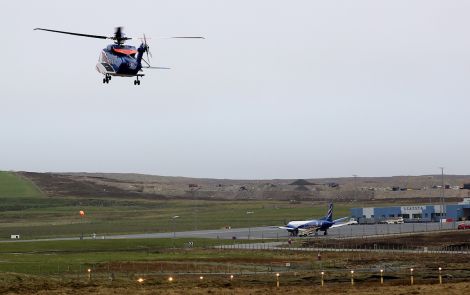News / More jobs cut at Scatsta Airport
ANOTHER 17 jobs are to go at Scatsta Airport due to a sharp reduction in offshore activity in the wake of falling global oil prices.
Services provider Serco, which operates the airport on behalf of an aviation consortium, laid off more than 20 staff last year and now says it has “regretfully” been forced to reduce its workforce by a fifth.
The company said the number of flights at Scatsta had reduced by 47 per cent since October 2015.
Serco put the slump down to the decline in oil prices, with a barrel of Brent Crude currently priced at $37 compared to nearly $70 last May, which had resulted in “a reduction in offshore activity and changes to the flying requirements of our customer, the Integrated Aviation Consortium (IAC)”.
Before redundancies in the autumn Scatsta had a workforce in excess of 100, but that is now likely to fall below 60.
Serco said some of the reduction would come from not filling vacancies and through redeployment, but it has now begun the process of placing affected employees “at risk” of redundancy and begun consulting with staff and trade union officials.
Serco’s contract director at Scatsta, John Thorne, said: “The declining global oil price is having repercussions across Shetland.
“At Scatsta, fewer flights, and a reduction in the days required to complete the current schedule, sadly mean we need fewer people to run the airport.
“This was not an easy decision to make, but it is imperative that our service is responsive to the needs of customers and remains cost effective.
“We hope the changes we are making will help safeguard the future of the airport and help us attract new business. This is a difficult time for the whole team and I will give my full support to all those affected.”
Become a member of Shetland News
SIC development committee chairman Alastair Cooper said the news was not surprising but he was “vexed” that more people are to lose their jobs.
“It’s not unexpected, but it’s very disappointing,” he said, “because Scatsta is a very good local employer and training ground for firemen for the Sullom Voe terminal and what have you.”
He said all eyes would be on Chancellor George Osborne’s budget to see if any measures are put in place to make life easier for oil and gas firms. That could affect how much activity goes ahead in the east of Shetland basin in particular.
“There’s a lot hanging on the political situation locally as well as internationally – when the budget comes we might have an indication of the short to medium term,” Cooper said.
With BP expected to push through with more job cuts at Sullom Voe Oil Terminal in the weeks ahead, Cooper that discussions needed to be taking place about Shetland’s economic future.
“The situation we have is the private sector saying they have a lot more work if they could only get the workers,” he said, “but it’s matching the skills to the jobs available.
“My fear with Sullom Voe is you’re going to end up with more folk taking early retirement, which is not economically active. I’m looking for an economically active community.”
Cooper said renewable energy could be part of the answer to creating new jobs, but he wants to see a strengthening of the isles’ traditional industries – primarily seafood and fishing – to go hand in hand with the “buoyant construction economy” expected in the next few years.
Become a member of Shetland News
Shetland News is asking its readers to consider paying for membership to get additional perks:
- Removal of third-party ads;
- Bookmark posts to read later;
- Exclusive curated weekly newsletter;
- Hide membership messages;
- Comments open for discussion.
If you appreciate what we do and feel strongly about impartial local journalism, then please become a member of Shetland News by either making a single payment, or setting up a monthly, quarterly or yearly subscription.










